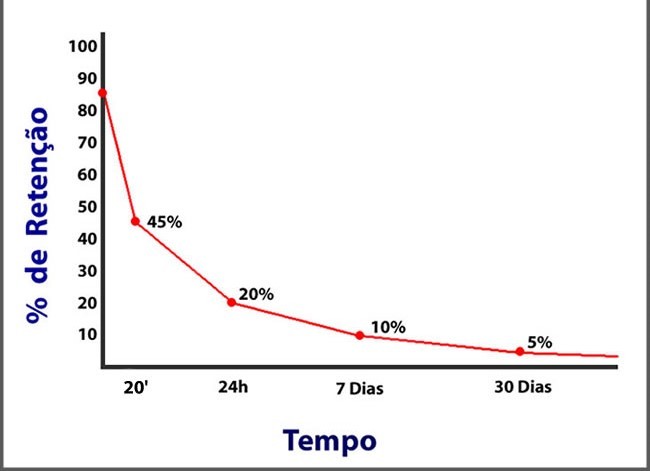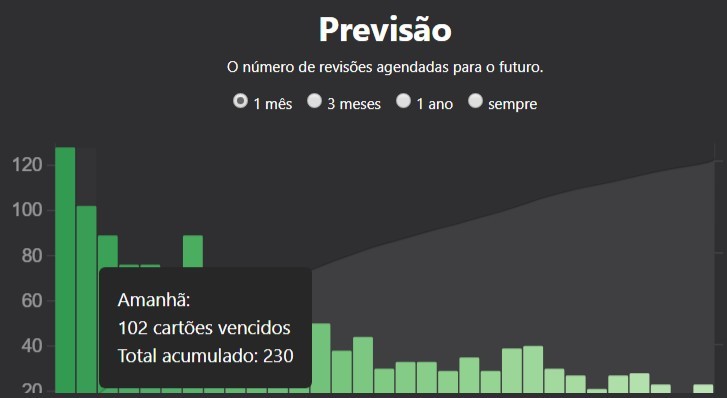There are several ways to memorize some information, and Anki is one of them. Anki is nothing more than a software created for the computer that is also available for smartphones, it serves to assist in the retention of information in the long term.
By doing so, even someone who thinks he has a bad memory, can remember well what he learned in his studies, giving those who use it above average results in tests.
In this article we are going to cover what you most need to know about this amazing tool that can certainly help you memorize Japanese, Korean, English or whatever else you are learning.
We also recommend reading:
- KANA: Definitive Guide to Hiragana and Katakana - Japanese alphabet
- Tips and Precautions when using Google Translate for Japanese
- 40 greetings - Good morning, Hi, and Hello in Japanese
Anki - 暗記
The word Anki came from Japanese and means Memorization. Have you ever wondered how the Japanese manage to have such incredible results in tests?
In addition to the strong dedication to studies, the Japanese have always paid a lot of attention to Flash Cards.
Which are nothing more than a way of repeating the same information that was previously learned. An example of its use is:
You learn a piece of information, then you put on the front of this paper card a clue or question and on the back the answer to that clue, your goal is to get right what that is.
For example, in the front you put "House" from English and in the back "House" which is the meaning. Although it seems simple, it is something ultra effective and that guarantees the practitioner the chance to take information from short-term to long-term memory.
It is important to remember that our brain is very rigid about what it will or will not keep in its consciousness, if it suspects that it is not important, it will gradually remove it from its memory, until it disappears. To support this scientifically, there is a theory known as: The Forgetting Curve Theory.
This theory uses as a basis to exemplify this concept a graph, in this graph it shows that we retain information for a certain period. Within the concept, in 24 hours we have forgotten almost 80% of this information, and as the days go by we almost totally forget what we learned later.

How to overcome the forgetting curve?
The study approach using Flash cards is highly recommended in order to reduce the forgetting curve, however, if you need to memorize that information for a longer period, it will require you to organize yourself, separate the papers or notes in the right order, on the day right, on the shelf or list which you have determined as your place of study.
However, if we look at it practically, not everyone has that time or patience, and many who do, would certainly like something that shortens this path.
With that comes Anki, the SRS program, which means: spaced repetition system.
Hence the name. It is a system that will repeat over spaced periods of time what you have added to it. It will automatically show you at the right time when you need to review what you have learned.
Suppose you added today the English word House which means; House.
The next day he will show you again, why? Because we forget almost 80% of information in 24 hours, so you need to see it again the next day, and that's how Anki works,
The program will show you before you forget 80%.
Anki buttons
So you review the next day, what will he do? Anki has 4 answer options.
Wrong, Difficult, Good and Easy.
Depending on your answer, he will space out, show this card on a different day. It is recommended that you always click between Good and Wrong.
But why? The reason for this is that we often forget the card, but we want to get rid of it, so we end up clicking on hard, thus making it take too long to appear, the same when pressing easy, it takes a long time to appear, thus causing you often forget to click on Hard or Too Easy, so it is recommended to choose only between the buttons: Wrong and Good.

The article is still halfway through, but we recommend also reading:
Why use Anki?
Anki is ideal for anyone who wants to remember what they study in depth. Regardless of age, it's even a great way for you to improve your memory too, I'm an example.
After I started using Anki, I found I was able to remember things more easily.
Why that? This is because our memory, the more it is developed, the better it is, the things you used to forget, you forget more rarely.
Is Anki Free?
Anki is free for Android, Windows, Mac and Linux users, however for IOS users it is paid, around $24.99.
This is because Android developers are not the same as iOS developers. Fortunately there are free alternatives that connect to Anki for iOS.
How to Install Anki on Mobile or Computer
If you go to the link below, you will find the official website, going down the bar you will see the download options available, when you click on the format you want, if you are on your cell phone it will direct you to the application, if you are on your computer the download will start .
What not to do when using Anki
What generates a lot of frustration in many Anki users, making many also give up is the misuse, if you don't know, Anki in theory should be done every single day.
Because? Because what you added, for example, in the last month may appear that day with other and other cards. And if you don't see them on this day, and decide to see those the next day, this day's will be added to the next day.
Many, for not having the courage, end up giving up. However, some people don't know, but it is possible to add rest days from Anki, through extensions that you add to Anki. One of them is, for example, the link below, before adding any extension to Anki, search for it, this extension was created by Migaku, let's leave the link below the site.
There are other extensions within Anki to make your life easier when using it, but we won't go into too much detail here.
Leaving this technical part a bit, if you want to have rest days without having to use these extensions, you just have: new limits on Anki.
In Anki you can see in your statistics how many Cards will appear for you the next day.

So you create your own limit, if the next day will appear, for example, more than 100, then on the current day today, you don't see any new ones, if you want only 50, or 30, or even 20 to appear every day , so you don't add to Anki for a while and just look at the ones you already have in Anki, until you get to this number.
In terms of time, the more used to Anki you get, the less time you can stay, in other words, it is very possible and easy to stay in Anki between: 5 to 10 minutes daily.
And then I ask, what are 5 to 10 minutes of your day in exchange for the result you will have?!
So you must remember that adding too much in Anki when you already have too many to look at is a mistake.
Also avoid adding things you didn't learn before, that is, add only what you learned and understood in your studies, because if you didn't, Anki will work as a means of learning and memorization, making it even more difficult. It's a possibility, but avoid it until you really understand Anki more deeply.
Not researching or studying about Anki is another mistake, it's important to always be trying to understand more and more about it to get the most out of it with the least effort, even today I consider myself an expert in Anki, I keep looking daily for ways to make it more efficient.
Read also:
- Omae wa mou Shindeiru... Nani? - Meaning and origin
- Itadakimasu and Gochisousama - What is the real meaning?
- What does Yamete Kudasai and Dame mean?
Results when using Anki the right way
If you use Anki to do well in your tests, you will notice a blatant difference between your results before and after, you will be able to internalize more and what you usually make mistakes will tend to notice more and correct better over time.
If you're a medical student and know you need to remember huge names and concepts that tend to elude memory, you'll notice that these ideas weren't that difficult, they just needed a little repetition.
If you are a language student like me, and you know that to learn any language it is important to review an expression, word, sentence many times, you will realize that when you go to watch or read something in the language, what you studied is showing up and you are managing to remember.
Myths and Lies about Anki
The first myth about Anki is if you use him and only he will be a beast in the area he is exercising.
Is not true. Something important about memory that I didn't mention is that it works with contexts, the more different situations you see something, the better your memory will stick.
Anki serves to enhance this.
That is, if you use it for English, you should: see that in Anki, see that being used by a native, see that explained in your class, you must be involved in all activities that involve that information you just learned.
Whether you are a medical student or a language student, it is always important to know how to separate theory from practice, what you learn needs to circulate around you need to live learning, and for that you will need to perform, read, listen, speak, write about and anything that can make your mind specialize in that.
Another myth about Anki is that if we're going to see it elsewhere, why have Anki? Anki is not to replace, it is to enhance something you already know and do.
Imagine a scenario where you use cheap fuel and in another you use a more expensive fuel for your car, both will take you where you want, but you know that good fuel will make a huge difference, as it will guarantee more performance to your car.
A common myth is also saying that Anki sucks, because if you lose everything you've written in it so far, you'll forget it.
This is not true, because if you use Anki and also the other resources that provide you with learning and exposure to what you study, for example, books, classes, podcasts, then you will see again what you put in Anki, just reinforcing even more the memory you had of having done it in Anki several times, an example of this is me.
I've already lost a deck of cards inside Anki that contained 3,000 sentences in the language I study, but a good part of what I had learned there remained, and whenever I saw it, I actually remembered it.
They also say that Anki is a lot of work, it's easier to consume things at once and review in the traditional way. It's an option, but part of this idea of work created in people's minds is precisely because they don't know in depth all the ways to use it, using it in a way that is laborious.
But in the end, even with all that, I still don't feel good using Anki, so what?
It happens. Anki is for everyone, it is adaptable for everyone, but desire, will, motivation, discipline are not born in it is born in those who use it.
While studying discipline is important, it's also important how we feel about the approach we take when studying something, if we hate the form, the method we use, we can actually think of different ways to fill that space with other techniques.
But it's always good to think if the problem is the thing or it's us, because we criticize the efficiency of something, or the method just because we don't like it.
Thanks for reading this far, I hope this text will help you in the first steps of using Anki, which is becoming more and more popular among students all over the world in different fields of study, until next time.






